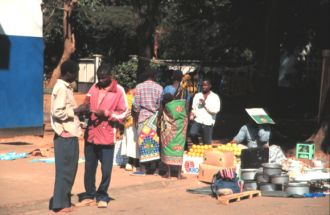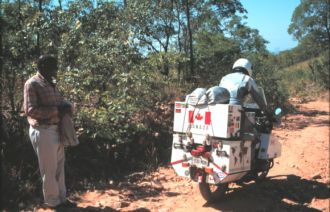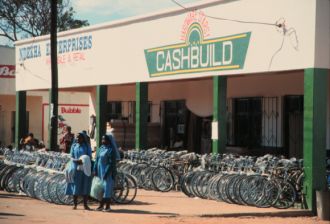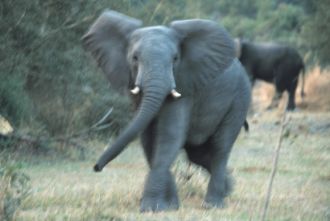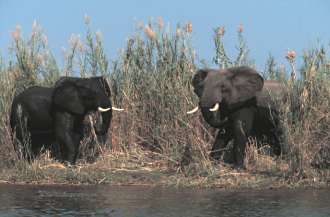Grant and Susan in Malawi
July 28, 1997
We crossed the border from Tanzania into Malawi. Exiting Tanzania was pretty easy, just present carnet to the man in the rough timber 3-walled hut, who enters all the details into a book, up to the main building, where they do exactly the same thing again, this time stamping the carnet and our passports, and we're done. So nice after Egypt.
Street vendors in Kasungu, Malawi
Entering Malawi was similar, no big deal, we didn't even need the carnet, just a 'temporary importation permit'. 50 kwachas, about US$3.50. Oops, we don't have any kwachas, and there is no way to change here, we should have changed Tanzanian shillings in Tanzania for kwachas, but the rate was very bad from the touts, so we didn't, forgetting that we were likely to need local currency at the border - although we are used to being able to exchange money on the spot. No problem, he said, you can pay at the exit point. Okay, thanks. Next stop to the police check. Nobody there. I went back to the last guy I talked to and told him the policeman wasn't there, who said "Not your problem. I'll let you through." And he walked over and opened the gate and let us through!
The road from Mbeya to the Tanzanian border was quite good, but we had been warned that the road from the Malawi border south was pretty bad. We were still a little shocked to see the reality. It wasn't really that there were a lot of potholes, more accurately there were bits of pavement here and there on the mostly dirt road. Some was better, but overall it was pretty bad. The best stretches were where they gave up on the pavement and instead of patching or filling in the holes with dirt they just ripped the whole thing up and went back to pure dirt road.
The next day we were planning on going to Livingstonia, and on to Nyika National Park, on a secondary road off the main road. We almost missed it - all the road signs in Malawi are very old, painted black with very faded, almost extinct white lettering on it, and then didn't notice the road, continuing on until we saw the sign for people coming the opposite way, turned around, and figured that in between had to be the road. Yup. That narrow dirt lane was it. Had to be, there were even people sitting at the intersection under the shade of a tree, obviously waiting for transport in.
We headed up the road, only slightly concerned, but the road immediately deteriorated and started going UP, very steeply, winding around tight hairpin bends. We saw a sign, Bend 21, then Bend 20, and the road got worse. Huge washout ruts, starting up the hillside and coming across the road and around the hairpin bend, left a series of deep gouges in the road that had to be crossed at a 45 degree angle, at the same time going steeply up. We were actually pulling wheelies over some of these ruts, the front end bouncing around merrily, and the road got worse - steeper, and very rocky. I finally got forced to stop, and told Susan to get off and walk up this next stretch. She was pretty unhappy by this time, the bouncing around and twitching and wiggling making her feel like we were going to crash any second - not true, it was more like any minute.
Main highway through north Malawi, from the back of the bike | 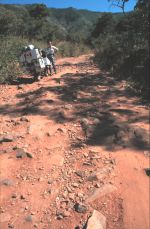 Susan and bike on the road to Livingstonia, Malawi |
Anyway, I started to move up on my own, and immediately got stuck, a rock jammed under the tire against the exhaust pipe. Unable to move at all, I got off, and immediately stripped off helmet and jacket, as it was also getting very hot. We spent the next 20 minutes trying to pry the rock out from under, where it had managed to very thoroughly wedge itself. While we were doing so, a couple of local girls came down the hill, baskets on their heads, and stopped to talk. They told us that the road ahead did not get better, as I had hoped. It was more of the same. And 16 km more of it to Livingstonia, then another 25 or so of worse road (according to our map) to the game park lodge. Right, we're out of here.
Well, as soon as we get unstuck anyway. A big branch and some creative cursing finally did the deed, and I rode the bike by myself up to the top of this stretch of hill, so that I could turn around. It would have been suicidal to even try turning around where we were stuck. The run down was relatively easy compared to the ride up, and we headed off to Kasungu National Park instead, but only got as far as Mzuzu that night.
Grant watched by amused local on road back down from Livingstonia
The dirt road in to Kasungu next day was a stunner - easily the best dirt road I have ever seen, it was freshly graded, hard, hard packed, and plenty wide. There were a couple of spots where they were working on it, and the detours were a little tricky, but not bad. We arrived at the park gates after an easy ride of about 45 minutes. The rangers were very nice, happy to see us, welcome to Kasungu, but no you can't ride into the park on the motorcycle. But it's 20 km to the lodge. "Well we can contact them and they will come and get you, and you can leave the motorcycle here while you go on to the lodge for a few days." Not good. After our experience in Serengeti, where we returned to Arusha to discover the bike had fallen over (possibly someone horsing around with it) and scratched the boxes up, we're not enthused at all about leaving it for days at a time.
Evidently some game park ranger had a lion jump on him from out of a tree while on motorcycle, (possibly a myth), and so now the government won't allow motorcycles into the parks. The rangers were apologetic, but they're government employees and that's the policy.
We checked out the prices for the accommodation while we tried to decide what to do. The prices made it easy! The lodge was US$170.00 ppp - that's per person per night. All meals included and a game drive and a walk, but wow! The average income in Malawi, just for comparison, is US$200.00 per year.
After further conversation with the guards, we decided to can it, and were not very happy about it. We were a bit shocked by the prices, and feeling pretty annoyed, after the debacle of the road to the other park, (Nyika) and now this hassle. To make it worse, the guards also told us that there was a good road into Nyika via Rumphi, which we had passed about 4 hours back. Too late now for that.
We were just getting our helmets on to leave, when the manager of the lodge drove up on his way in. Never one to miss an opportunity to tell people what I think, I (Grant) said to him, (after saying hello of course), that we were having a hard time figuring out how he justified his prices, which were twice as much as Ngorongoro Crater Wildlife Lodge, (already expensive), and which is a lot more well-known than Kasungu National Park in Malawi! His attitude was very poor, basically that "if you don't like it don't go", so after exchanging a few more comments we left, with our opinion unchanged about the rate, given their cost structure in a country as poor as Malawi. They weren't full, either.
Anyway, back down the road we go. A couple of kilometers on, we came to a spot where they were working on the road, dumping fresh dirt and spreading it out - leaving the road very bad, soft and deep, the worst for us. We made it through, but the bike plowed into the soft ground badly, causing big wobbles and wiggles. Twice I saved us from crashing by putting my foot down quickly, once each side, and banged both shins thoroughly on the cylinders.
Nuns in front of the bicycle shop, Kasungu, Malawi
We stayed in Kasungu that night, and Thursday headed to Lilongwe the capital. Very pretty country, lots of friendly people, but obviously very poor. Mud huts with grass thatched roofs, some newer huts made of brick, but still thatched with grass, tiny little villages, lots of people walking, a few bicycles, no cars to speak of. A few buses, always grossly overloaded, people spilling out of the doors and windows, enormous bundles of produce and goods tied onto the roofs, the pile often higher again than the bus, often with a huge list to one side or the other, whether from bad loading or broken springs I don't know.
Arriving in Lilongwe, the usual search for accommodation. There are only 3 hotels, all owned by the government and managed by a private company, and a few guest houses, which are not recommended, no security, (they even have signs warning you of thieves masquerading as staff and ripping you off right in the parking lot) or camping at the golf course. The 3 hotels are separated by price and services - US$80.00: nice grounds, but no TV, no direct line phone; US$167.00: TV and direct line phone, or US$200.00 for TV and phone, very deluxe. We ended up at US$80.00.
The most aggravating thing about the prices here in the city and in the game parks (same goes for Tanzania) is not just that they're charging them in a country this poor, when their costs are so low, it's that they're MUCH higher than you'd pay in the US or Europe for less facilities! If anyone had ever told us that hotels in Lilongwe, Malawi would cost this much, we wouldn't have believed it. And it's not like the money is trickling down to the majority of the population or getting invested in infrastructure, judging by the towns we've seen, the appallingly bad roads and the phone service. It's just making a few well-connected people rich, and will eventually kill their tourist industry. How many Europeans will come to Malawi if they know the prices are twice as high as in Europe for poorer quality accommodation?
We've reached the 60,500 km mark on the speedo, that's 60,500 km since we started traveling in 1986, about 40 countries and 4 continents. There's about another 8,000 to go in Africa. Starting to feel like the end is near, and we'll be ready to settle down for awhile and enjoy the luxury of sleeping in the same bed for more than a couple of nights in a row.
To properly finish off Malawi, we need to update on our visit to Liwonde National Park. On Saturday, we headed off from Lilongwe, the capital, planning to go to Blantyre. Since we were going past Liwonde National Park, we decided to try getting in, so we would have at least done one national park in Malawi.
Anyway, we attempted to enter the Park from the main entrance, paid the park entrance fee at the gate, but were advised by Park HQ that we couldn't go to Mvuu Lodge by the main road "There are wild animals in here", and must go in via Ulongwe. Grant tried to bluff us in by telling them we were used to bears on the roads in Canada, but didn't wash. So, back out to Liwonde, and since it was getting late in the afternoon (sun sets at 5:30 here), we stayed in Liwonde for the night.
The next day (Sunday) we drove into the park from Ulongwe. The tertiary road into the park had several bad sandy stretches, and of course the motorcycle really doesn't like sand, wiggles all over and scares me to death. Inevitably, it fell over once, of course we were only going about 5 miles an hour at the time, so it was quite a soft landing. Just after righting it (with assistance from a local), another motorcyclist drove up. Amazing coincidence - the first motorcyclist we've seen since Egypt. Mike is a British accountant but has been working in Harare, Zimbabwe for the Red Cross, and taking a few months to ride around southern Africa following the conclusion of his contract. Anyway, he rode with us to the park entrance and the river, where we had to leave the bikes in a compound guarded by park employees, and then take a short boat ride to the lodge, which was wonderfully situated on the river, and worth the trip.
We did a late afternoon game drive, saw some elephants fairly close up (one even did a mock charge at us, which can be distinguished from a real charge only because he stopped before trampling us) but not as much game as we would have liked to see, and much of it very shy of vehicles.
Elephant makes a 'mock' charge at us - he stopped!
Next morning we did a game walk at 6:00 a.m. - we saw some birds and a very pretty sunrise (amazing time of day when you aren't used to early morning). Then a quick breakfast and a boat ride at 8:00 a.m. The river has amazing amounts of hippos and crocodiles, and lots of birdlife.

African Fish Eagle taking off from a branch overhanging the river.
We also saw five elephants quite close by near the shore, who seemed unhappy that we had interrupted their swim! This was on the same side of the river which we had ridden in on the motorcycle to the dock, so we're not sure why that was considered a safer route than the other one!
Mvuu Lodge was lovely, we stayed in one of their tents at $30 per night, but meals were all extra. We didn't have reservations, and they were quite busy as this is high season. We prepared our own breakfast and lunch but had dinner at the restaurant, which was excellent. The bar overlooks the river and you can sit for hours and watch crocodiles and hippos and birds, very relaxing. We could have stayed here quite awhile, but all good things must end. As the same outfit that runs Mvuu has a number of other lodges in Botswana, Namibia, Zimbabwe and South Africa, we'll look them up again if we get near one of their other facilities, as we were fairly impressed with the operation - far and away better than the lodges in Tanzania for service.
Elephants on the Shire River, from Mvuu National Park, Malawi
Tuesday we returned with Mike by boat across the river, then rode out to the park entrance and Ulongwe via the same bad road. Grant got stuck (our bike is considerably heavier than Mike's as he was traveling solo) and was helped out by a bunch of locals, then with me off the bike managed to get through a couple of bad spots. Whew! Reached the (fairly bad) tarmac, then on through Zomba to Blantyre, where we are now.
August 6, 1997 - Blantyre, Malawi
So, we have managed to do a national park here in Malawi, and did enjoy it a lot. As a general comment about Malawi, the people are fabulous - much more outgoing than the Tanzanians, and very friendly. We have felt very welcome and very safe here, especially in contrast to Nairobi (we did miss the riots there, thankfully). We would have no qualms about recommending Malawi as an off the beaten path African destination. Lake Malawi is popular for snorkeling and diving, but the main attraction for us is the wild animals, and we didn't see as much of them as we would have liked, partly because we couldn't go into the parks with the bike.
Malawi is certainly a country of contrasts, with evidence of extreme poverty and extreme wealth, sometimes very close to each other. After decades of rule by Hastings Banda (elected President for Life in the early 70s when he was already 71, he ruled until they kicked him out 3 years ago by which time he would have been in his mid-90s!), they elected a new president in 1994. Unfortunately, the new president seems to be trying to emulate Banda. We were told elections had been postponed, and there certainly is some political unrest. We saw marches and demonstrations, and heard political harangues via loudspeaker in the main cities.
The currency is also declining at a rapid rate, which may reflect the political uncertainty. It's a very entrepreneurial country, lots of roadside vendors, but the economy seems to be artificially propped up by the aid agencies. We were told that when the Mozambique civil war was hot, there were hundreds of thousands of refugees on Malawi's borders, and the international aid agencies were all based in Malawi to run the refugee programs. Now that the refugees have gone home, the demand created by the aid agencies has collapsed somewhat.
So, now it's on to Zimbabwe via Mozambique. Now, I can hear you saying "Mozambique! Are they crazy?" We are going through what's called the Tete Corridor, which was kept open even during the civil war by the Zimbabwe army, and considered quite safe now (no land mines) for transiting to Zimbabwe. We pick up our Mozambique transit visa tomorrow, and all systems go we'll head through on Friday, Aug. 8.
Member login
Announcements
Thinking about traveling? Not sure about the whole thing? Watch the HU Achievable Dream Video Trailers and then get ALL the information you need to get inspired and learn how to travel anywhere in the world!
Have YOU ever wondered who has ridden around the world? We did too - and now here's the list of Circumnavigators!
Check it out now, and add your information if we didn't find you.
Are you an Overland Adventure Traveller?
Does the smell of spices wafting through the air make you think of Zanzibar, a cacophony of honking horns is Cairo, or a swirl of brilliantly patterned clothing Guatemala? Then this is the site for you!
Hosted by Grant and Susan Johnson, RTW 1987-1998
Johnson's Home
Who Are We?
The BIKE Story
Press Stories about us
Our "Rules of the Road"
Photo Album 500+ images
"Quick" highlights -
Top 31 photos
Mexico
Central America
New Zealand
Australia
Europe
England
Isle
of Man
Norway
Sweden
Denmark
Germany
Netherlands
Spain
Gibraltar
Africa
Tunisia
Libya
Egypt
Kenya
Tanzania
Malawi
Zimbabwe
Botswana
Namibia
Caprivi Strip
Etosha
Sossusvlei
South
Africa
South America
Argentina
Tierra del Fuego
Chile
Peru
Ecuador
Colombia
Next HU Events
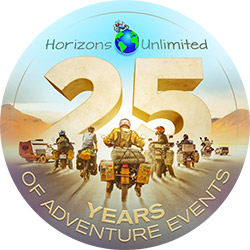
Be sure to join us for this huge milestone!
ALL Dates subject to change.
2025 Confirmed Events:
Virginia: April 24-27
Queensland is back! May 2-5
Germany Summer: May 29-June 1
Ecuador June 13-15
Bulgaria Mini: June 27-29
CanWest: July 10-13
Switzerland: Aug 14-17
Romania: Aug 22-24
Austria: Sept. 11-14
California: September 18-21
France: September 19-21
Germany Autumn: Oct 30-Nov 2
Add yourself to the Updates List for each event!
Questions about an event? Ask here
Books

All the best travel books and videos listed and often reviewed on HU's famous Books page. Check it out and get great travel books from all over the world.
NOTE: As an Amazon Affiliate we earn from qualifying purchases - thanks for your help supporting HU when you start from an HU Amazon link!














